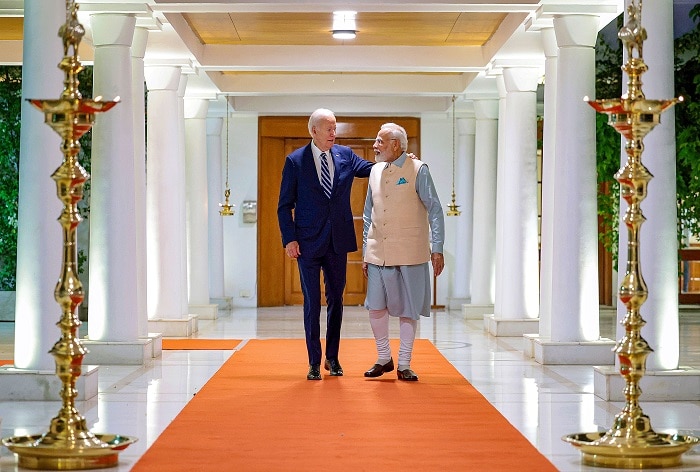
[ad_1]
The US also welcomed India’s candidature for the UNSC non-permanent seat in 2028-29, the White House said in a statement.

New Delhi: Prime Minister Narendra Modi and United States President Joe Biden held a bilateral meeting in New Delhi on the sidelines of the G20 Summit on Friday. In a major development, the US President reaffirmed his support for a reformed UN Security Council with India as a permanent member. The US also welcomed India’s candidature for the UNSC non-permanent seat in 2028-29, the White House said in a statement.
“Continuing to share the view that global governance must be more inclusive and representative, President Biden reaffirmed his support for a reformed UN Security Council with India as a permanent member and, in this context, welcomed once again India’s candidature for the UNSC non-permanent seat in 2028–29,” said Biden’s joint statement with Prime Minister Narendra Modi after bilateral talks in New Delhi on Friday night.
In their over 50-minute talks, Modi and Biden vowed to “deepen and diversify” the bilateral major defence partnership while welcoming forward movement in India’s procurement of 31 drones and joint development of jet engines.
The two leaders also deliberated on cooperation in nuclear energy, critical and emerging technologies such as 6G and artificial intelligence, and ways to fundamentally “reshape” multilateral development banks.
Biden and Modi also exuded confidence that the outcomes of the G20 Summit will advance the shared goals of accelerating sustainable development, bolstering multilateral cooperation and building consensus around inclusive economic policies to address greatest global challenges.
A joint statement issued at the end of the talks said President Biden lauded India’s G20 Presidency for further “demonstrating” how the G20 as a forum is delivering important outcomes.
“The leaders reaffirmed their commitment to the G20 and expressed confidence that the outcomes of the G20 Leaders’ summit in New Delhi will advance the shared goals of accelerating sustainable development, bolstering multilateral cooperation, and building global consensus around inclusive economic policies to address our greatest common challenges, including fundamentally reshaping and scaling up multilateral development banks,” it said.
The joint statement said the “leaders re-emphasised that the shared values of freedom, democracy, human rights, inclusion, pluralism, and equal opportunities for all citizens are critical to the success our countries enjoy and that these values strengthen our relationship.”
PMO’s statement
The PMO said in a statement that Modi conveyed his appreciation for President Biden’s vision and commitment to further strengthen the India-US comprehensive global strategic partnership, which is based on shared democratic values, strategic convergences and strong people-to-people ties.
It said the two leaders commended the progress in implementing the futuristic and wide-ranging outcomes of the prime minister’s historic State visit to the US in June 2023, including under the India-US Initiative for Critical and Emerging Technology (iCET).
“The leaders welcomed the sustained momentum in bilateral cooperation , including in the areas of defence, trade, investment, education, health, research, innovation, culture and people-to-people ties,” it said.
The two leaders agreed that India-US partnership was beneficial not only for the people of the two countries but also for global good.
The joint statement said the US President welcomed issuance of a Letter of Request from India’s defence ministry to procure 31 MQ-9B remotely piloted aircraft from American defence giant General Atomics.
The two leaders also welcomed completion of the Congressional notification process and the commencement of negotiations for a commercial agreement between GE Aerospace and Hindustan Aeronautical Limited (HAL) to manufacture GE F-414 jet engines in India.
Modi and Biden also reaffirmed technology’s defining role in deepening the India-US strategic partnership and lauded ongoing efforts through the Initiative on Critical and Emerging Technology (iCET) to build open, accessible, secure, and resilient technology ecosystems and value chains, based on mutual confidence and trust.
Biden arrived in Delhi at around 7 pm in his first visit to India as the US President. He was greeted at the airport with songs and a musical show.
(With PTI input)
[ad_2]